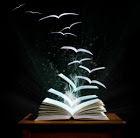In February 2022, although the end of the local requirements to keep people safe from COVID19 was in sight, we continued to gather using Zoom.
After the usual ritual of lighting the candle in the chalice, the gathering involved the usual mixture of periods of silence, music via YouTube and other open online sources, readings, prayer/meditation, and some reflective words by the person presiding for the day.Also, as it was the start of our ninth year of gathering together, we included a discussion about membership, and mutually invited each other into relationship within the group for the next twelve months. In this way we can make clear to each other and any other body that enquires, just who it is that is involved in making decisions to steer the group during the next twelve months.
In this time of our muster and our roll call,
May we remember that the task of a church is to serve the needs of people.
The need to feel loved.
The need to connect with people.
The need to connect with ideas that come through people, through being with people.
The need to belong.
In contrast, although we do each need this from time to time, the ultimate aim of going to a church is not to find mending for ourselves, nor a sense of belonging for ourselves, nor to serve ourselves at all.
The aim of going into a church is to come out of church again,
But to come out - and re-enter the world - changed;
And hence to bring change to the world.
The readings were taken from the book of Job in the Bible (Job, chapter 33 verses 12-33), and ‘We Are One - A Manifesto for Humanity’, by Simenon Honoré.
"The reading we heard is ascribed to a speaker named Elihu, who is in conversation with Job. Elihu starts out by saying that we all have times, when we have an impulse to do something, but something stops us. We may have bad dreams about our plans, and fear stops us. Or something strikes at our pride, hard enough to stop us in our tracks. Or our plans make us ill. Or if we acknowledge our bad intent to others, and say sorry, we will be mended.
“We may like to smile at the archaic poetic language of the Bible, but the image sticks:
even as we lie dying as a result of our bad behaviour, if only a single angel, out of the whole multitude of angels that there may be, speaks up for us, speaks up for the good that we have done in our life, then we will certainly be saved.
“The second reading talks about inner light, inner joy, which the writer says is there in everyone. Not only this writer, but mystics throughout the ages have said the same. I have heard these terms used too: clarity, union, awakening, awareness, bliss, oblivion, enlightenment.
“What the writer is saying is that there is a state — a 'no thing' — that we might all find given to us if we make the right preparation; a state that transforms us interiorly, and also changes the way we relate to the world.
“Very importantly, all the mystics and prophets are clear on this: this indescribable state exists more fundamentally than our normal mode of being."
“So this state is not affected by any of our good luck or bad luck along the way; nor by any of the good deeds we do to connect ourselves with others and serve others; nor by our alienating deeds that disconnect us from others, and even from ourself. This state is not, and cannot ever be, earned. On the other side of the coin, no one can ever be dispossessed of this state (though we can be in our own personal desert, blocking our own way to reach it).
“This state is not under our control in any way, not in the sense that we can use the word ‘our’ in any usual way. We did not make the universe, we did not set this way of being in place: we are inside this paradigm.
“We did not make the indescribable state of awakening, and we cannot be certain of attaining or experiencing this state in this life, though there are certain preparations that might make to help. This state is unaffected by our lives in the world, though remaining accessible to us. This is beyond our normal comprehension.
“Though our first reading sets it in some very different words, the essence of this concept runs the same through both readings:
“There is something — a ‘no thing’, a state — that is beyond.
“A joy, a light, a clarity that, using common language, we can only say is somehow ‘bigger’ than we are. It is not to be bidden by us. Not at our behest. The writers of both our readings are certain: there is something beyond us that we simply cannot control.
“Only a person deluded by the idea of self-sufficiency will deny this. And the only thing to do, when we have recognized that, is to resign ourselves to it, or as Muslims say, to surrender ourselves to it.”





No comments:
Post a Comment
We welcome your enquiry and like to converse. This is where we set out some of what we offer. If you don't like what you read, scroll on by. We reserve the right to disregard unappreciative audiences.
Any personal email addresses supplied in your comments will be removed from posts during the moderation process to protect your data.